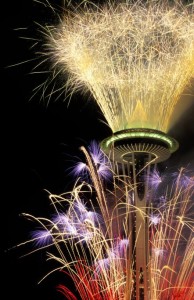Metro May Consider Later Service on Holidays
Seattle's  transit service winds down around 1 AM on most nights. The evenings of July 4th and December 31st, with big crowds (drunkenly) watching late fireworks, are two nights where that seems less than adequate. Metro is typically reluctant to add additional trips that are hard to usefully publicize, and Sound Transit sticks to its required 4-hour Link maintenance window, even on special occasions.
transit service winds down around 1 AM on most nights. The evenings of July 4th and December 31st, with big crowds (drunkenly) watching late fireworks, are two nights where that seems less than adequate. Metro is typically reluctant to add additional trips that are hard to usefully publicize, and Sound Transit sticks to its required 4-hour Link maintenance window, even on special occasions.
Nevertheless, King County Councilmember Dave Upthegrove introduced legislation requiring King County to look into expanded Metro service on these nights. The bill (full text here) would require a report by June 1st, 2017 to discuss service options, peer agency comparisons, funding sources, and coordination opportunities.
The Council referred the bill to the Transportation, Economy, and Environment (TREE) committee, which will hold a hearing on March 7th. Full text of the bill below the jump.
WHEREAS, the Fourth of July, New Year's Eve and New Year's Day are holidays featuring fireworks displays and midnight celebrations which, by their very nature, result in large public gatherings in the late evening and early morning, and
WHEREAS, law enforcement agencies encourage celebrants to behave responsibly and provide increased enforcement of impaired driving statutes in support of the state's Target Zero initiative to reduce traffic fatalities and serious injuries, including those caused by impaired driving, and
WHEREAS, despite these efforts, the Washington State Patrol reports twenty-four driving under the influence ("DUI") arrests in King County during the period December 31, 2016, through January 3, 2017, and thirty-two arrests for DUI December 31, 2015, through January 3, 2016; with two hundred fifteen arrests for DUI in a five-day period for the Fourth of July in 2015 and two hundred twenty-three arrests for DUI in a five-day period for the Fourth of July in 2016, and
WHEREAS, bus service to and from these gatherings is a means of assuring safe transportation for more attendees, and
WHEREAS, transit agencies in Chicago, Long Beach, Los Angeles, Milwaukee, Minneapolis-St. Paul, Orange County (California), Portland (Oregon), San Francisco, San Jose and Vancouver (British Columbia) are among those providing free transit service on New Year's Eve and early morning of New Year's Day;
NOW, THEREFORE, BE IT MOVED by the Council of King County:
A. Because of the benefits to public safety and personal mobility, King County Metro should explore options for providing free late-night service on the Fourth of July and the evening of New Year's Eve and early morning of New Year's Day. King County Metro should explore partnerships to fund, promote and sustain the free late-night service. King County Metro should also encourage other transit agencies in the central Puget Sound region to provide free late-night service on those holidays.
B.1. The executive is requested to develop and transmit a report that identifies options for the provision of free late-night bus service on the Fourth of July, New Year's Eve and New Year's Day. The report shall include but not be limited to:
a. analysis and a recommendation on options for extending service hours for these holidays on some or all bus routes in the Metro service network, including a methodology for identifying an appropriate level of extended service including number of routes, duration and provision of service throughout the county;
b. a report on other transit agencies that provide free late-night service on New Year's Eve and other holidays, including information on these agencies' service planning, costs, and partnerships with public agencies and private firms;
c. analysis of costs, potential funding sources, and administrative or operational considerations that could affect the provision of free late-night service on those holidays;
d. coordination with cities, Sound Transit, other transit agencies, law enforcement agencies and other public sector agencies including, but not limited to, planning, communications, staff support and cost sharing;
e. coordination with private sector firms including but not limited to trade associations, the hospitality industry, the food and beverage industry, health care providers, transportation network companies, the American Automobile Association and local news media firms;
f. a list of stakeholders consulted for the report, including but not limited to representatives from groups focused on low-income communities, racial equity, public health, cities, Sound Transit, other transit agencies, law enforcement agencies, trade associations, the hospitality industry, the food and beverage industry, health care providers, transportation network companies and the American Automobile Association. The report shall explain how stakeholder consultation took into account geographic diversity throughout the county; and
g. analysis of the role of technology in implementing these transit options for free late-night service on these holidays.
2. The executive shall transmit the feasibility report, and a motion adopting the report by June 1, 2017, in the form of a paper original and an electronic copy to the clerk of the council, who shall retain the original and provide an electronic copy to all councilmembers, the council chief of staff, the policy staff director and the lead staff for the transportation, economy and environment committee, or its successor.